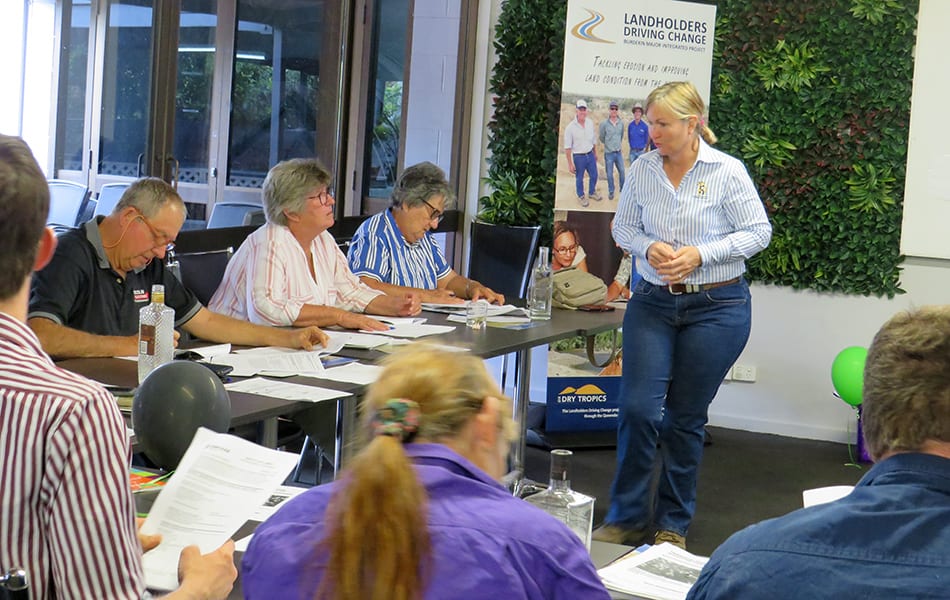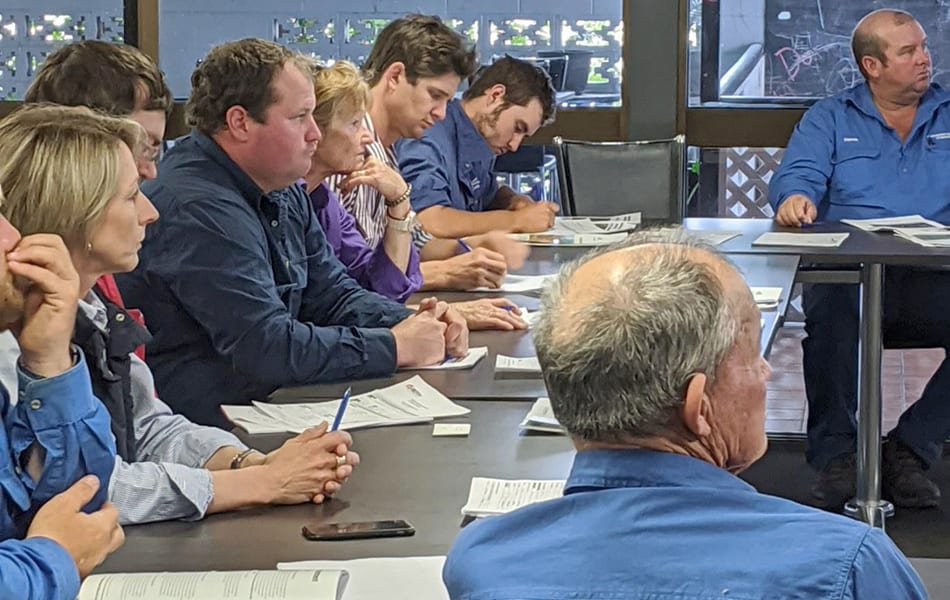
Belinda Callanan TH9 Outdoor Services teaching in the classroom to (from left) Graham Gordon, Leanne Groocock and Isabel Sloane.
EYES FRONT… participants in the Chemical Training course listen intently to presenter TH9 Outdoor Services’ Belinda Callanan.
Learning how to deal safely with chemicals on the property
Twenty-eight landholders, contractors and other land managers attended nationally-accredited chemical training in Collinsville in September.
The two workshops were organised in response to a request from the BBB community.
Many landholders rely on chemicals to protect their agricultural enterprises from pests, weeds and diseases. Chemicals provide many benefits to primary production but they need to be used responsibly to minimise adverse effects.
Landholders need to take care when storing, transporting, using and disposing of chemicals to ensure their own safety, their neighbours’ safety and to protect the environment.
The nationally-accredited training was delivered by Belinda Callanan of TH9 Outdoor Services, and covered three units:
- AHCPMG301 Control Weeds.
- AHCCHM304 Transport and Store Chemicals.
- AHCCHM307 Prepare and apply chemicals to control pest, weeds and diseases.
This course is in response to the updated Australian Qualification Framework (AQF) Level 3 Units of Competence that ChemCert accreditation is based upon and where industry consultation initiated a heightened-focus on application planning and practical skill sets.
The training focused on the safe use of chemicals meeting legal obligations and requirements, and to assist landholders to work safely and economically with chemicals.
Topics covered included:
- Legislation and licensing.
- Labels and safety data sheets.
- Integrated pest management.
- Pesticides and toxins hazards and toxicity.
- Chemical transport, storage, disposal, record keeping, spills and risks.
- Handling, mixing, applying chemicals and use of personal protective equipment.
- Spray drift and weather conditions.
- Equipment and calibration.
The workshops were supported by the LDC Grazier Support and Influencing Other Land Managers activity areas.
Commercial Operators' Licence Training
If you distribute (spray, spread or disperse) herbicides using ground equipment (any machine or apparatus other than an aircraft), on land that you do not own or occupy, you may require a commercial operator’s licence.
As a licensed commercial operator, you may only carry out the work in the course of the business or under the direction or authority of a licensed ground distribution contractor or aerial distribution contractor.
Regulating the use of herbicides and other agricultural chemicals is important, as misuse can result in potential harm to agriculture or livestock, the environment, trade, or human health.
Operator licensing, based on the operator undertaking a training qualification, provides the community and others with confidence that commercial operators are applying herbicides responsibly — particularly by ensuring product label instructions are followed to eliminate or minimise herbicide misuse.
Under the Agricultural Chemicals Distribution Control Act 1966, if you intend to use ground equipment to distribute herbicides on land that you or a close relative do not own or occupy, you may need a commercial operator’s licence. You must be at least 17 years of age to be issued a commercial operator’s licence.
Factors that can determine if you need a licence include the type of ground equipment that you are using and whether you are carrying out the ground distribution in a declared hazardous area, a regulated area or non-regulated area of the state. You do not need a licence if the ground distribution is outside the regulated areas in Queensland.
A commercial operator’s licence is issued for either a one-year or three-year period, nominated by the applicant when they apply
To qualify for an unrestricted licence you must demonstrate that you hold an approved accreditation by providing statements of attainment, obtained after completion of the following Australian Qualification Framework (AQF) nationally recognised units of competency:
- AHCCHM307 – Prepare and apply chemicals to control pest, weeds and diseases.
- AHCPMG301 – Control weeds.
- AHCCHM304 – Transport and store chemicals.
By completing the accreditation, you will have nationally-endorsed qualifications used to recognise and assess the skills and knowledge people need to perform effectively in the workplace.


